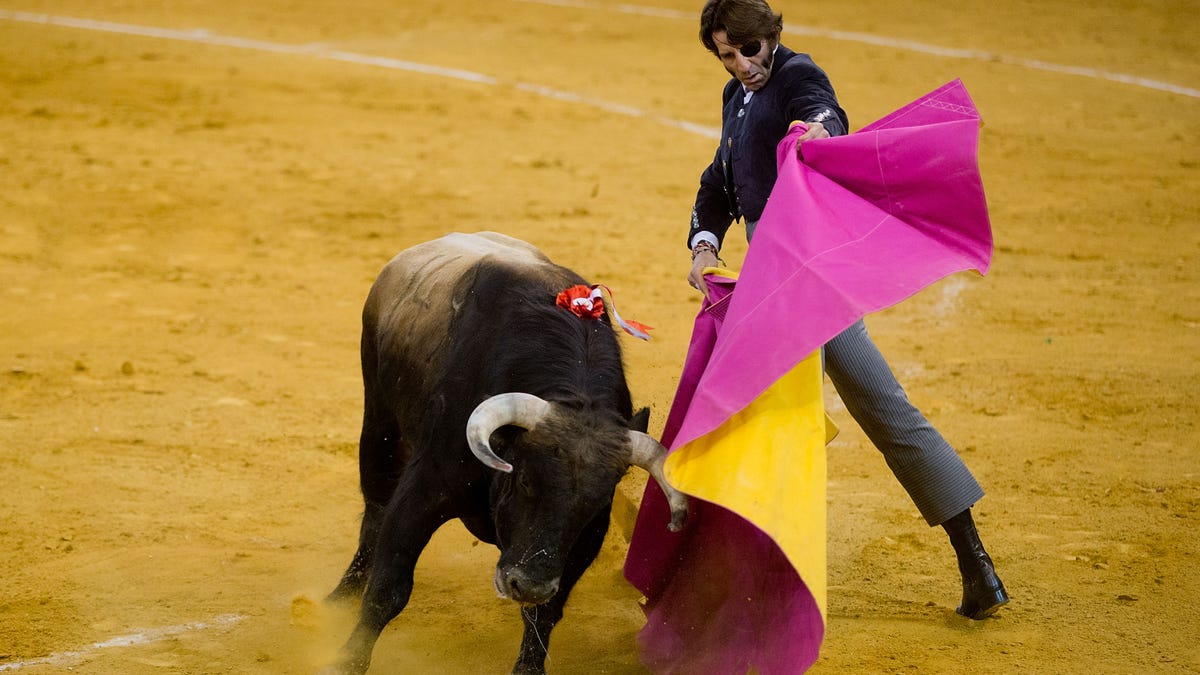
MADRID, SPAIN - MARCH 22: Spanish bullfighter Juan Jose Padilla performs during the Bullfighting Charity Festival held in honor of Spanish Banderillero Vicente Yanguez alias El Chano at Palacio Vistalegre Arena bullring on March 22, 2014 in Madrid, Spain. (Photo by Gonzalo Arroyo Moreno/Getty Images) (2014 Getty Images)
A leading animal-rights group in the United States has a solution for aspiring Colombian bullfighters engaged in a two-week hunger strike over the loss of their profession – find a new line of work.
In fact, the People for the Ethical Treatment of Animals is offering to pay for their retraining to find a less gruesome job.
"Since bullfighters are comfortable with death – having enjoyed spearing, stabbing, and killing bulls – appropriate jobs might be funeral attendant, mortuary cosmetologist, or graveyard security guard, or they could learn a harmless new skill, such as flower arrangement," the organization said in a statement on Wednesday.
The controversy dates back two years, when Gustavo Petro, Bogota's leftist mayor, suspended bullfights at La Santamaria, the capital's history-steeped bullring, saying that the arena would be devoted exclusively to non-violent entertainment.
A former leftist rebel and anti-corruption senator, Petro annulled the contract of the Corporacion Taurina de Bogota, which organizes bullfights, after the January-February 2012 season. The company says it has the right to hold bullfights there at least through March 2015.
- Picture This: Colombian Photographer Nereo López Tells Stories Through His Lens
- Colombian President: Cross-Border Rebel Raid Was Justified
- Naja, Lingerie With A Philanthropic Twist
- Spanish Matadors Turn To Peru To Achieve Fame
- Colombian Village Fears Closure Of Small Coal Mines That Have Sustained Them
- From the Catwalk to the Soccer Pitch
- Little Man With Big Dreams
With no other appropriate venue in the capital, aficionados must travel to other towns for the spectacles.
That may have satisfied animal-rights activists outraged at the sport's ceremonious slaughter of bulls, but it didn't sit well with the city's elite, for whom Sunday afternoon corridas were big social events, regular fixtures on newspaper society pages.
And needless to say, the ban is opposed vigorously by Bogota's matadors, eight of whom – including several teenagers – began a hunger strike outside the arena earlier this month.
"(Petro) has marginalized us," complained 19-year-old Diego Torres, a matador apprentice. "Here, everyone looks at us like we're the scum of the earth."
One of the hunger-strikers, weakened from a liquid-only diet, had to be hospitalized last week, Torres said, adding that other strikers might need emergency treatment soon.
The apprentices have also lost income. Each earns a bit more than $330 per fight.
But they shouldn't expect any sympathy from PETA.
"The bullfighters who are currently whining about losing their bloody trade have made their living by tormenting bulls who have been weakened by beatings, had their horns shaved to keep them off balance, or had petroleum jelly rubbed into their eyes to impair their vision," PETA President Ingrid E. Newkirk said. "The barbaric and gory spectacle of bullfighting – so damaging to show children and so wrong in the mind of any kind person who abhors gratuitous cruelty – belongs in the history books, and everyone would be better off if the matadors were gardening or cleaning floors in a mortuary."
It's possible, however, that Bogota's bullfighting days may not be over.
One of nine members of Colombia's Constitutional Court, which is deciding the issue, told The Associated Press it will rule in the next week or so on whether Petro violated the constitution in refusing to rent La Santamaria out for bullfighting. The judge, who insisted on speaking anonymously to avoid being accused of partiality, said chances were good the court would rule in favor of the Corporacion Taurina.
But regardless of how the council rules, the hunger-striking apprentices, who spend their nights shivering in a tent they raised outside the ring, say they consider the sport a noble art, rich in tradition and well worth their personal sacrifice.
One of them, 23-year-old Andres Manrique, said he has already lost 13 pounds.
"I'll be here until my body gives out," he said.
The Associated Press contributed to this report.
Follow us on twitter.com/foxnewslatino
Like us at facebook.com/foxnewslatino

